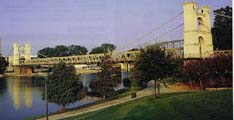
|

|
Bridge Street 'mayor' and his hatcheryBob Martin |
|
Today the Hilton Hotel stands at the spot. But for many years Homer Martin Hatchery was there at First and Bridge Street, across from the old Suspension Bridge and the Farmers' Market. Homer Martin, a high-spirited individual, a generous man of good humor, was small in stature but tough as nails. To many he was known as the "mayor of Bridge Street." He also was my dad. Homer hatched baby chicks in his large incubators which held 52,000 eggs. The incubators were about 12 feet by 12 in size, about the dimensions of a small bedroom. He hatched turkey and duck eggs in smaller incubators designed for such purposes. In the spring he hatched and sold baby chicks. To keep the income rolling, in the fall he bought and sold pecans. Many a small boy earned spending money by bringing in sacks of native pecans gleaned from the pecan trees along the river banks. Homer even advertised on KWTX Radio ... "Paper shell pecans, 25 cents a pound!" In the winter he bought and sold furs. People would be amazed at the numbers of mink trapped in the region. Homer paid trappers $18.00 to $24.00 for their mink hides. Of course, he had to buy the skunk furs so he could get the trappers to sell their mink catches. This left a distinctive odor in the hatchery for many weeks. Homer took pride in his high-tech hatchery. He was quick to point out the advances, especially to any young ladies who cared to listen. On one occasion he took out his metal pencil and pointed to a highly sophisticated control device. His pencil got too close — and zapppp, he shorted out the circuit. Later he said, "I don"t understand it. I just took my pencil and I pointed it there and — zapppp, he shorted out the second one." These cost him $100 each — a large sum in those days. Homer prided himself in his memory, got occasionally it misfired. Once a person gave him a hot check in payment of merchandise, and he was duly alarmed. "I remember him well," Homer said. "I can just see his face before me." When later it was learned that the hot check artist was a woman, I said, "Dad, I thought you said it was a man who wrote you the bad check." He looked a bit taken back, but only for a moment. Then he responded with an answer that needed no further explanation. "Well," he said, "I knew it was a man or a woman." |
Allah Jean Ambrose, my sister who still lives in Waco, tells the story of Wallace, the African-American worker at the hatchery. Wallace told Homer, "There's going to be a big storm here someday, and all the incubators except one will fall into the basement. I'm going to go to the one that will not fall ... and that's where I'll ride out the storm." Homer told him, "Wallace, relax. The Huaco Indians settled here because they said 'There will never be a tornado in Waco.' " On May 11, 1953 an historic tornado destroyed the hatchery, all of Bridge Street and much of South and downtown Waco. I happened to be on the phone, as local news editor of KWTX, calling to the police department for my daily news briefing. The call was misdirected to an office in City Hall. A lady answered the phone screaming, "There's a terrible storm here ... there are cars flying around the square." As Wallace had predicted, all incubators crashed into the basement ... except one. That's the one he ran into in order to ride out the storm. After the tornado passed, Homer opened the heavy vault-like door and walked home, unscratched and uninjured. All other occupants in the building got under heavy equipment tables and escaped any major injuries. There was one other survivor ... a small wet and frightened baby turkey. A passerby picked it up and put it in his coat pocket to keep it warm. He later told us he raised the turkey to adulthood ... another miracle produced by the storm. After the storm, my brother Jack and I sat on either side of a rather formidable insurance adjuster and convinced him that, indeed, the hatchery was a total loss. The life of the hatchery had come to an end. Bob Martin was a reporter for KWTX during the early 1950s and was Uncle Elihu on the KWTX kids program in the later 1950s. |
|
Return to First Person home page |
|